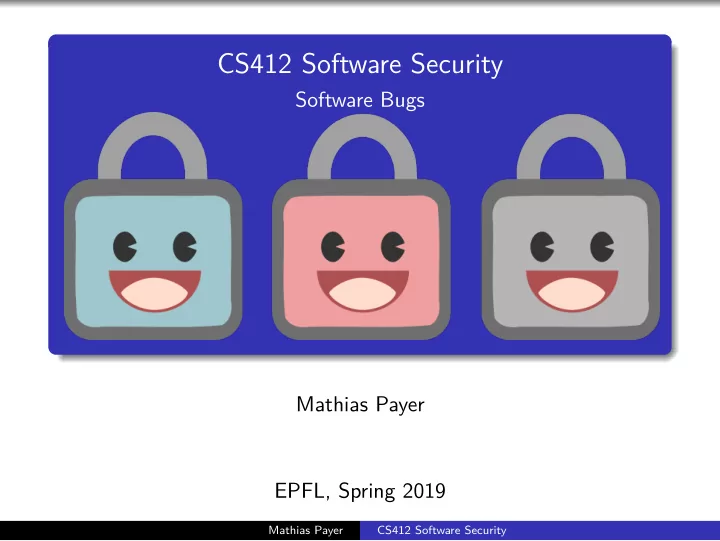

CS412 Software Security Software Bugs Mathias Payer EPFL, Spring 2019 Mathias Payer CS412 Software Security
From Software Bugs to Attack Primitives Attack primitives are exploit building blocks Software bugs map to attack primitives , i.e., enable computation A chain of attack primitives results in an exploit , the underlying bugs of the attack primitives become vulnerabilities Mathias Payer CS412 Software Security
Attack primitive: arbitrary write int global[10]; void set(int idx, int val) { global[idx] = val; } An attacker with control of idx and val can set any 4b location +/- 2GB around global to an arbitrary value. Mathias Payer CS412 Software Security
Attack primitive: arbitrary write, limited location void vuln(char *u1) { /* assert(strlen(u1) < MAX); */ char tmp[MAX]; strcpy(tmp, u1); /* equivalent: while (*u1 != 0) *(tmp++) = *u1++; */ return strcmp(tmp, "foo"); } An attacker with control of u1 can overwrite values (except \0 ) on the stack above tmp , ending with an \0 byte. Note that constrained writes only allow some values to be written. Mathias Payer CS412 Software Security
Attack primitive: arbitrary read int global[10]; int get(int idx) { return global[idx]; } An attacker with control over idx and the return value can read arbitrary 4b values +/- 2 GB of global’s address. Mathias Payer CS412 Software Security
Common bug types Not all bugs map as clearly to primitives as the earlier examples. C/C++ provides many different opportunities for failure. Mathias Payer CS412 Software Security
Improper initialization typedef unsigned int uint; int getmin(int *arr, uint len) { int min; for (int i=0; i<len; i++) min = (min < arr[i]) ? min : arr[i]; return min; } Mathias Payer CS412 Software Security
Improper initialization typedef unsigned int uint; int getmin(int *arr, uint len) { int min; for (int i=0; i<len; i++) min = (min < arr[i]) ? min : arr[i]; return min; } min is not initialized and may have an arbitrary value. Mathias Payer CS412 Software Security
Side effects if (foo == 12 || (bar = 13)) baz == 12; Mathias Payer CS412 Software Security
Side effects if (foo == 12 || (bar = 13)) baz == 12; bar is set if foo!=12 , while baz is never set. Watch out when calling functions in an expression, their side effects will linger. Mathias Payer CS412 Software Security
Scoping int a; void calc(int b) { int a = b*12; if (b + 24 == 96) a = b; } Mathias Payer CS412 Software Security
Scoping int a; void calc(int b) { int a = b*12; if (b + 24 == 96) a = b; } The local variable a is assigned while the global variable a is not modified. Mathias Payer CS412 Software Security
Operator precedence node *find(node **curr, val) { while (*curr != NULL) if (*curr->val == val) return *curr; else *curr = *curr->next; } Mathias Payer CS412 Software Security
Operator precedence node *find(node **curr, val) { while (*curr != NULL) if (*curr->val == val) return *curr; else *curr = *curr->next; } The arrow operator -> and the dot operator . bind more tightly than dereference * , parenthesis would solve the problem. Mathias Payer CS412 Software Security
Control-flow int x,y; for (x=0; x<xlen; x++) for (y=0; y<ylen; y++); pix[y*xlen + x] = x*y; Mathias Payer CS412 Software Security
Control-flow int x,y; for (x=0; x<xlen; x++) for (y=0; y<ylen; y++); pix[y*xlen + x] = x*y; A rogue ; terminates the statement in the second loop and the assignment will only be executed once. Only the (out-of-bounds) write pix[ylen*xlen+xlen] = xlen*ylen will be executed. Such errors may result in partial initialization, allowing an adversary to leak information. Mathias Payer CS412 Software Security
Control-flow if (isbad(cert)) goto fail; if (invalid(cert)) goto fail; goto fail; Mathias Payer CS412 Software Security
Control-flow if (isbad(cert)) goto fail; if (invalid(cert)) goto fail; goto fail; A double goto executes in any case (it is no longer scoped by the if) and always errors out. This was the famous goto fail bug in Apple’s SSL implementation. Mathias Payer CS412 Software Security
Control-flow if (isbad(cert)) goto fail; if (invalid(cert)) goto fail; goto fail; A double goto executes in any case (it is no longer scoped by the if) and always errors out. This was the famous goto fail bug in Apple’s SSL implementation. A hat tip to all Apple fans. Mathias Payer CS412 Software Security
Use-after-free Node *ptr = (Node*)malloc( sizeof (Node)); ptr->val = getval(); free(ptr); search(ptr); Mathias Payer CS412 Software Security
Use-after-free Node *ptr = (Node*)malloc( sizeof (Node)); ptr->val = getval(); free(ptr); search(ptr); A memory object is used after it has been deallocated. Mathias Payer CS412 Software Security
Type confusion arises through illegal downcasts Figure 2: Child1 *c = new Child1(); Parent *p = static_cast <Parent*>(c); // OK Child2 *d = static_cast <Child2*>(p); // Fail! Mathias Payer CS412 Software Security
Summary Memory safety bugs allow program state modification Spatial memory safety focuses on bounds Temporal memory safety focuses on validity Type safety ensures that objects have the correct type Large amounts of bug classes lead to fun vulnerabilities Mathias Payer CS412 Software Security
Recommend
More recommend